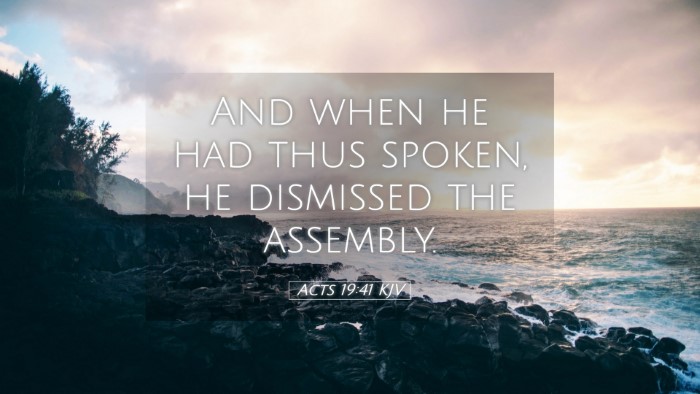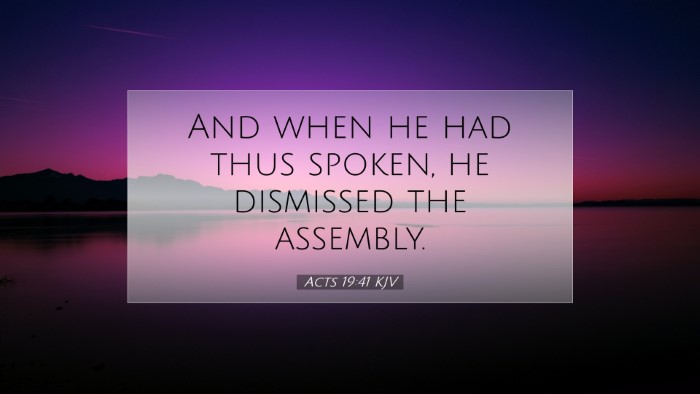Acts 19:41 Commentary
Verse Context: Acts 19:41 states, "And when he had thus spoken, he dismissed the assembly." This moment follows a tumultuous period in Ephesus where the Apostle Paul had encountered significant opposition from local craftsmen, particularly those involved in the worship of Artemis, a prominent local deity. The uproar was sparked by the threat Paul posed to their livelihood and the religious practices surrounding their crafts. This ending of the assembly marked a critical turning point in Paul's ministry in Ephesus.
Analysis of the Dismissal of the Assembly
Matthew Henry’s Insight: Matthew Henry notes that the dismissal represents a resolution to the chaos instigated by Demetrius and his followers. The authority of the town clerk played a decisive role in calming the assembly, thus validating the influence of civil governance in matters that intersect with religious fervor. Henry emphasizes that the town clerk’s address was not only a plea for order but also illustrated the wisdom in handling public disputes.
Albert Barnes’ Perspective: Albert Barnes elaborates on the significance of the assembly's dismissal as a means of restoring order. He posits that this event showcases the transition from disorder to a return to civic responsibility. The clerk's insistence on the legality of the situation speaks volumes about the implications of civil authority, especially in a diverse society where multiple beliefs coexist. For Barnes, the wisdom exhibited by the town clerk is a poignant reminder of the importance of dialogue amidst chaos.
The Role of Civil Authorities
Adam Clarke’s Commentary: Adam Clarke dives deeper into the nuances of the town clerk's speech by addressing the balance of power between civic and religious authority. Clarke asserts that the clerk’s statement serves as a reminder of the importance of civil order, suggesting that the church and state could coexist more harmoniously when both recognize their distinct roles. This text can be a biblical touchstone for discussions about the relationship between Christian faith and civic duty.
Key Themes and Theological Reflections
- The Sovereignty of God: The dismissal of the assembly under divine providence suggests that God ultimately maintains control over earthly affairs, even when chaos erupts. The calm after the storm is indicative of God's overarching plan for the church.
- Order in Worship: This passage illustrates the importance of order within the community of believers. The chaotic environment created by the silversmiths stands in stark contrast to the order expected in the body of Christ. Pastors can draw insights into stewardship of the church community from the clerk’s ability to restore order in a time of distress.
- Importance of Rational Discourse: The way the town clerk appealed to the assembly highlights how rational discourse is vital in resolving conflicts. In theological discussions, the call for reason over emotion can help foster environments where the truth of the Gospel can be shared more effectively.
Practical Applications for Ministry
For pastors and church leaders, Acts 19:41 serves as a multifaceted lesson. Here are some practical applications:
- Conflict Resolution: Just as the town clerk brought a semblance of peace to a volatile situation, church leaders are called to be peacemakers, encouraging discussions that promote understanding and resolution.
- Engagement with Civic Authorities: The relationship between the church and governmental structures must be guided by mutual respect and understanding. Developing good rapport with local authorities can enhance the church's witness in the community.
- Promoting Orderly Worship: Creating environments where worship can occur with focus and reverence requires intentionality. Church order fosters a space for genuine worship where God can be honored properly.
Conclusion
The dismissal of the assembly in Acts 19:41 encapsulates various themes of order, authority, and the interplay between faith and society. For theologians and Bible scholars, this passage offers fertile ground for exploring the dynamics of early church interactions with civil authority and the broader implications for contemporary Christian living. The insights from Matthew Henry, Albert Barnes, and Adam Clarke all draw attention to crucial aspects that remain relevant for today’s church in navigating similar challenges.


